A rundown of the people auditioning for the job — and what they bring to the ticket.
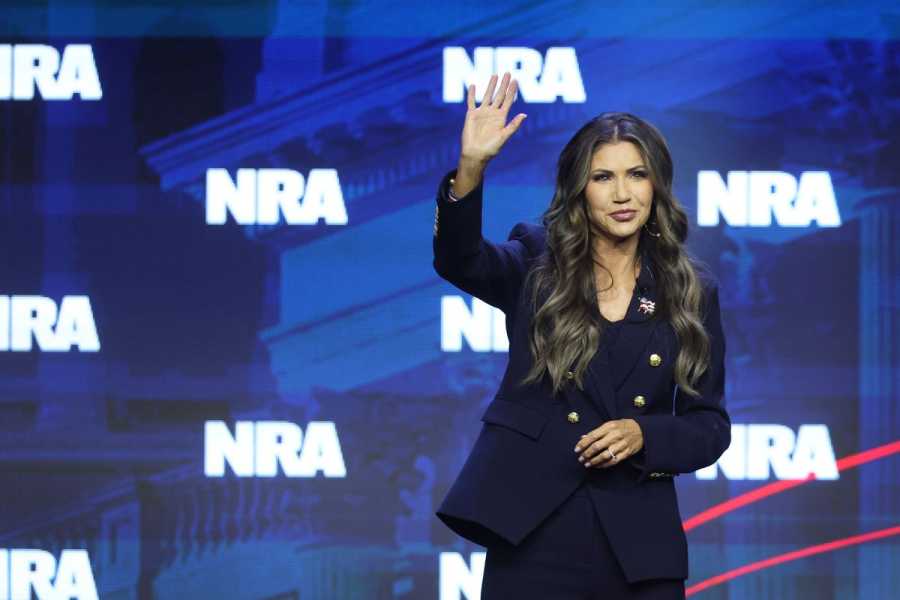
South Dakota Governor Kristi Noem speaks to guests at the 2023 NRA-ILA Leadership Forum on April 13, 2023, in Indianapolis, Indiana. Scott Olson/Getty Images Li Zhou is a politics reporter at Vox, where she covers Congress and elections. Previously, she was a tech policy reporter at Politico and an editorial fellow at the Atlantic.
Given former President Donald Trump’s dominance in the GOP primaries, attention is now turning to a new topic: who he’ll pick as his potential vice president.
In past elections, a nominee’s choice of running mate has been closely watched for a variety of reasons. They may bring experience to balance a nominee’s lack of it (think Barack Obama’s choice of Joe Biden), or they may appeal to a region or demographic that the nominee would like to reach (think Donald Trump’s pick of Mike Pence), or they may amplify a presidential campaign’s message (think Bill Clinton with Al Gore).
But the veepstakes — and the attention lavished on it — can also overstate the importance of the pick. Research has found that vice presidential picks matter much less to the outcome than is often assumed. The work of vice presidential scholars Chris Devine and Kyle Kopko, for instance, found that VP picks typically affect general election outcomes only if they’re extremely popular or polarizing. Those results have been echoed in other analyses, like a 2016 study by the Wall Street Journal that found most voters don’t take a candidate’s VP into account when choosing a president.
Who Trump picks might also mean even less in an election like 2024, given that the public’s views about the former president are already fairly set. Which isn’t to say the identity of Trump’s number two is unimportant. Trump’s age means his vice president may well have to step in for him, so who he chooses may prove to be consequential. His pick will also signal if he’s looking for a governing partner with more experience, and what, if any, other ideological viewpoints he might be willing to consider.
Thus far, sources told Fox Business a shortlist includes everyone from Ohio Sen. J.D. Vance to House Rep. Elise Stefanik (R-NY). As part of this decision, Trump is reportedly prioritizing both loyalty and selecting someone who won’t overshadow him. He has also said he would be interested in choosing a woman, according to the Associated Press.
In a Fox News interview, Trump described the individual he’s likely to select as a “very good person, pretty standard,” noting that he didn’t think people would be “that surprised.” He’s also said the top quality he’s considering is whether the person will be able to take on the role of the presidency.
With the caveat that other names may still come out, here’s what we know about the potential running mates Trump is considering — and what they’d bring to the ticket.
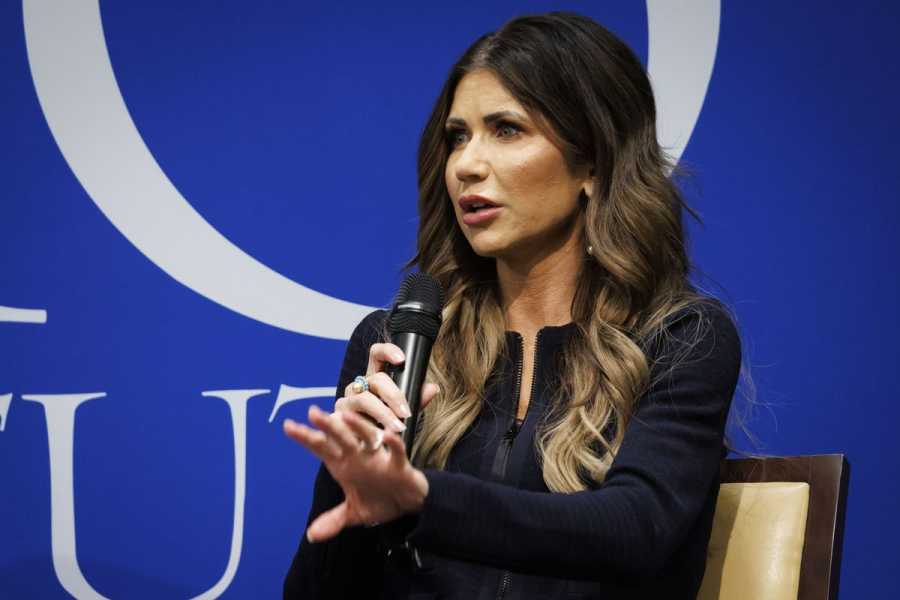
South Dakota Gov. Kristi Noem speaks at the Cato Institute. Ting Shen/Bloomberg via Getty Images
Kristi Noem
Who is she? Noem, 52, is the governor of South Dakota and a longtime Trump supporter. Noem is known for keeping the state open during the pandemic, her backing of gun rights, and her frequent appearances as a commentator on Fox News during which she defends Trump and stresses South Dakota’s economic successes.
What’s the case for her? Noem could plausibly be seen by the Trump campaign as appealing to women and bringing a younger voice to the ticket. Her executive expertise as governor could also be a selling point. And her conservative media savvy is another likely draw, as is her commitment to the MAGA agenda.
Trump emphasized the importance of her loyalty in a recent Fox News interview when he said, “Kristi Noem has been incredible fighting for me,” adding, “She said ‘I’d never run against him because I can’t beat him.’ That was a very nice thing to say.”
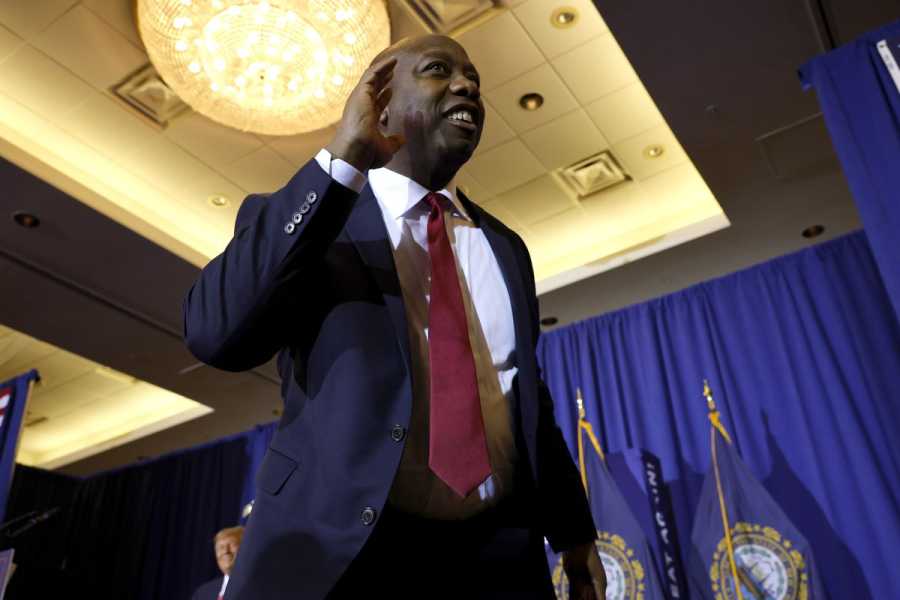
Sen. Tim Scott (R-SC) greets supporters during a campaign rally with Republican presidential candidate and former President Donald Trump at the Grappone Convention Center on January 19, 2024, in Concord, New Hampshire. Chip Somodevilla/Getty Images
Tim Scott
Who is he? A three-term, relatively conservative South Carolina senator, Scott, 58, is also the only Black Republican serving in the upper chamber. Scott is known for his own presidential run, which floundered early on, and his efforts to find a compromise on police reform in Congress. He previously framed much of his candidacy around pushing back against Democrats’ views on race, citing his own success as negating the idea that Black Americans are disadvantaged by systemic racism.
What’s the case for him? One of the more surprising findings about the 2020 election is that Trump made inroads with nonwhite voters, and a Scott selection could be seen by the campaign as a way of cementing those gains. Scott is also a religious social conservative with political views broadly in line with Trump’s, though his establishment credentials — including refusing to contest the 2020 election results — might assuage some Republicans wary of the former president.
Trump recently name-dropped Scott on Fox News, noting that he told the South Carolina lawmaker, “You’re a much better candidate for me than you are for yourself.”
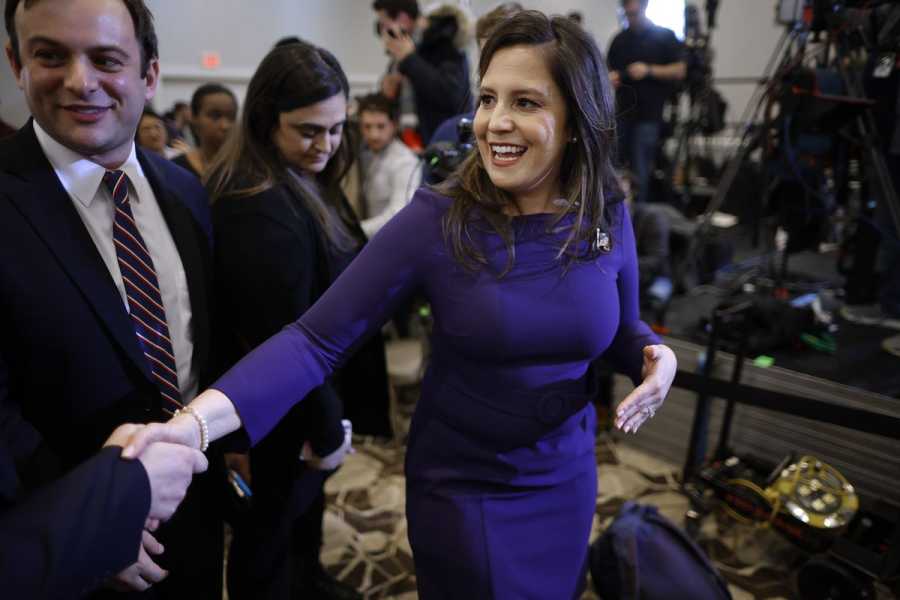
Rep. Elise Stefanik (R-NY) greets supporters before a campaign rally with Republican presidential candidate and former President Donald Trump at the Grappone Convention Center on January 19, 2024, in Concord, New Hampshire. Chip Somodevilla/Getty Images
Elise Stefanik
Who is she? Stefanik, 39, is a five-term House Representative and member of House Republican leadership. Once more moderate, she’s pivoted hard to the right in recent years after her upstate New York district swung in favor of Trump. Stefanik has raised her profile in congressional hearings pushing back against Trump’s impeachment and in a recent appearance questioning elite university presidents about antisemitism on campus. She’s also long advocated for growing Republican women’s representation in Congress, and backed fundraising and recruitment initiatives to do so.
What’s the case for her? Stefanik has had about a decade of legislative experience and has increasingly established herself as a prominent conservative voice who could potentially energize base voters. She’s signaled staunch fealty to Trump and would bring gender and age diversity to the ticket, along with strong rhetorical skills.
Her stated views are also pretty much consistent with Trump’s. Stefanik was among the House Republicans who voted to overturn the 2020 election results, and has embraced many of the same extreme positions as the former president on issues like immigration.

Sen. J.D. Vance (R-OH) appears in a pre-taped interview on Meet the Press in Washington, DC, on June 22, 2023. William B. Plowman/NBC/Getty Images
J.D. Vance
Who is he? Vance, 39, is a freshman Ohio senator, onetime Trump opponent, and now vocal Trump supporter. He’s also known as the author of Hillbilly Elegy, a memoir that chronicled his experience growing up in a working-class family in the Midwest.
What’s the case for him? Vance would fully embrace the MAGA agenda as one of Trump’s ardent defenders, as well as add a younger perspective. He would also bring his brief experience in the Senate and some business expertise from his background working in venture capital. Like many of the names on this list, he’s a pick that could resonate with the base.
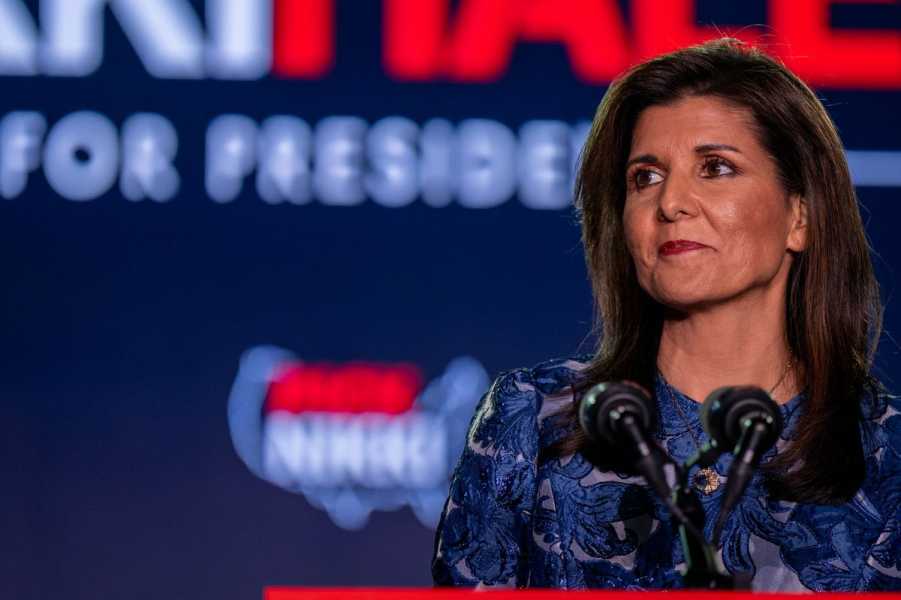
Republican presidential candidate and former UN Ambassador Nikki Haley delivers remarks at her primary night rally at the Grappone Conference Center on January 23, 2024, in Concord, New Hampshire. Brandon Bell/Getty Images
Nikki Haley
Who is she? Haley, 52, is a former governor of South Carolina and former ambassador to the United Nations during the Trump administration. Haley had a mostly conservative record as governor: She imposed aggressive voter ID restrictions that were initially blocked by the federal government for disproportionately affecting Black voters, but was also known for signing a bill to remove the Confederate flag from the state Capitol.
In the presidential race, Haley has positioned herself as more of a moderate compared to Trump, and has grown increasingly critical of the former president’s age and temperament. She’s struggled during primary season, failing to win the Nevada primary despite being the only major candidate on the ballot, and coming in second to Trump in New Hampshire’s contest. She’s tried to differentiate herself in a once-crowded GOP primary field with solid debate performances and her foreign policy experience. The daughter of Indian immigrants, Haley, like Scott, has also pushed back at the idea of systemic racism — most recently igniting an uproar when she questioned whether America was a “racist country.”
What’s the case for her? She’d bring a slightly different ideological stance to the ticket — including a greater commitment to preserving democracy and more hawkish views on foreign policy — as well as gender, age, and racial representation. She’d also offer past experiences as governor and UN ambassador, though her critiques of Trump could well rule her out from consideration. In a Fox Business report, sources said that Haley was not on Trump’s shortlist. Haley has also said she doesn’t “want to be anybody’s vice president.”
Sourse: vox.com